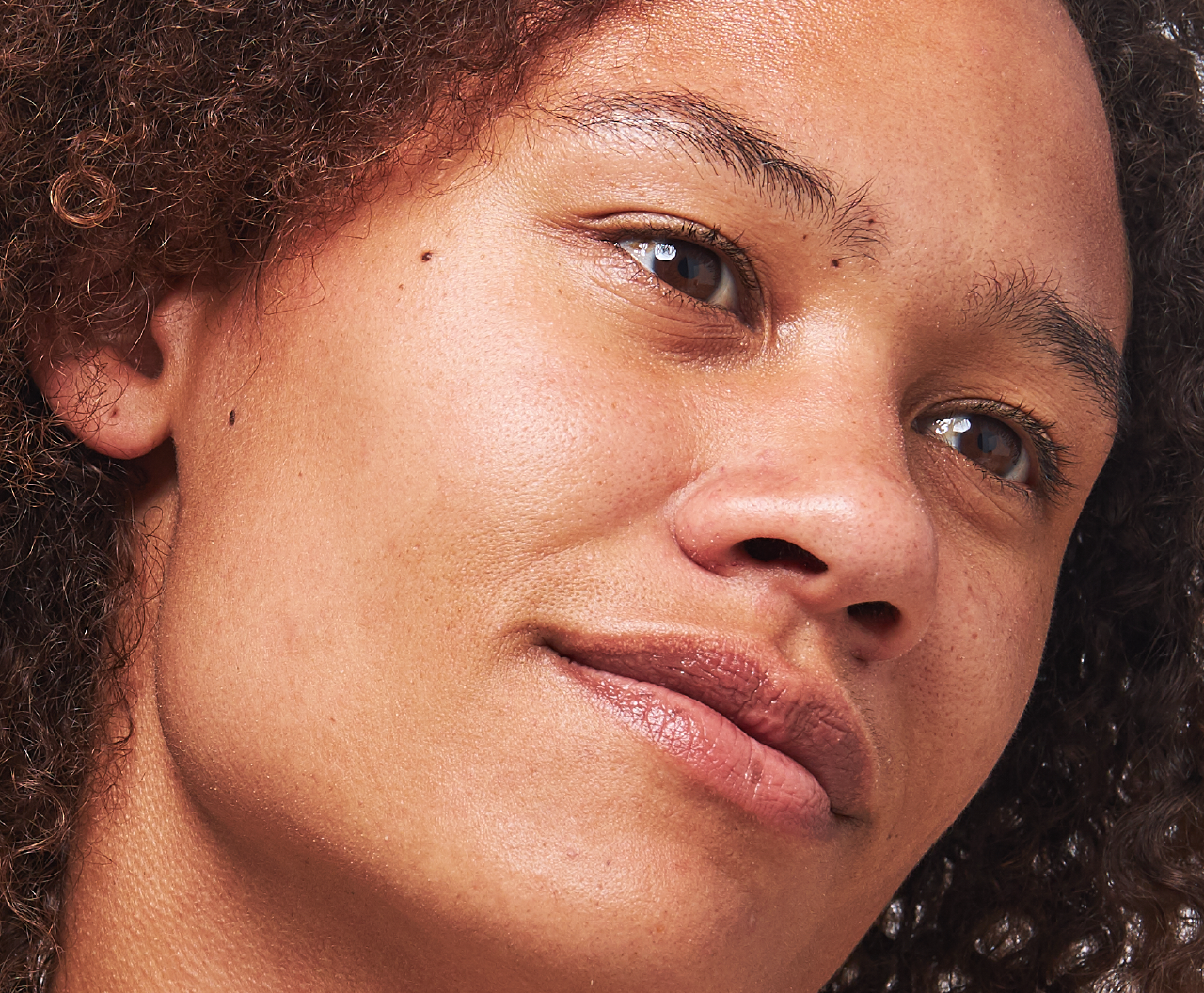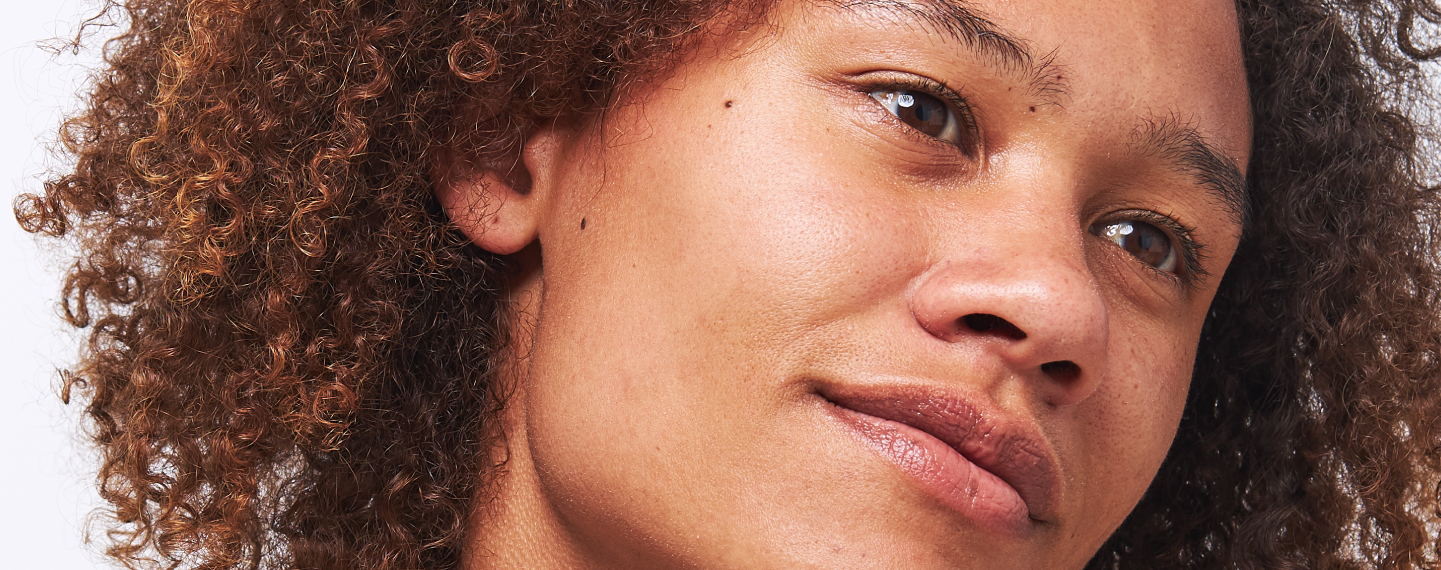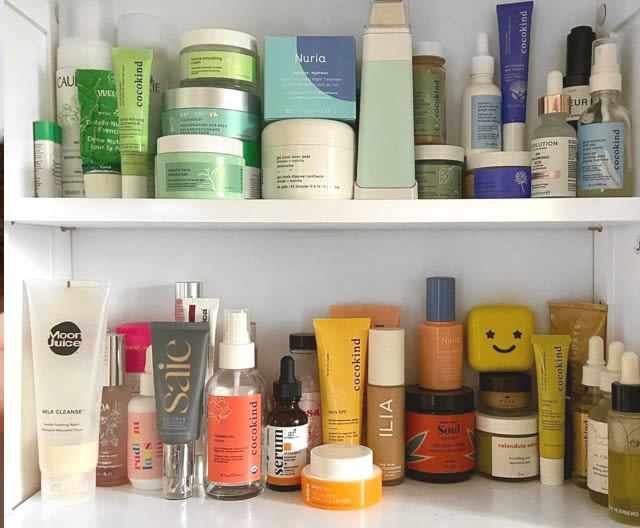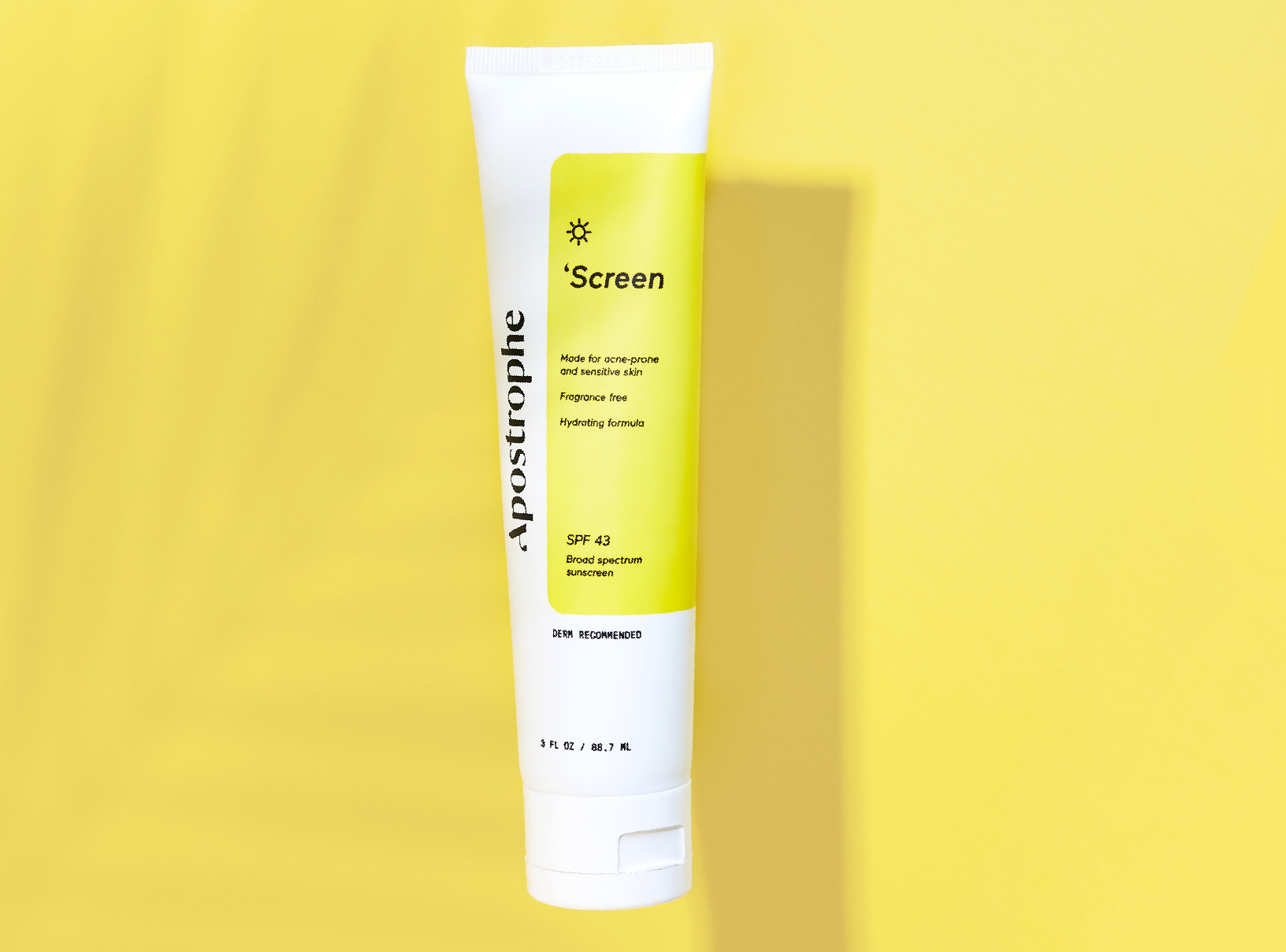Education
How to get rid of acne naturally


SHARE
Education
How to get rid of acne naturally
Medically reviewed by Kristin Hall, FNP
Written by Apostrophe Team
Last updated 4/1/2024
If you’re one of the tens of millions of American teens or adults affected by acne, you’ll be aware of how frustrating it can be to deal with breakouts.
Acne can vary hugely in severity, from the occasional whitehead, blackhead, or pimple to severe, inflamed, and painful acne.
While most acne can be treated using medications, you may want to try treating your acne with natural products before turning to a dermatologist or other healthcare provider.
Below, we’ve explained how acne breakouts happen, as well as natural treatments, habits, and lifestyle changes that you can use to treat acne breakouts and improve your skin.
Finally, we’ve explained what you can do if you have severe or persistent acne that doesn’t go away with natural treatments.
Why Acne Breakouts Happen
Acne develops when your hair follicles, or pores, become clogged with a mix of sebum and old, dead skin cells.
Sebum is an oil-like substance that’s produced by your skin. While some sebum is essential for your skin’s hydration and protection, when your skin produces too much sebum, the excess can build up inside your hair follicles and cause blockages.
Dead skin cells left behind by your skin’s turnover process can mix with sebum, contributing to these clogged hair follicles.
When bacteria grow inside a clogged follicle, it can become red, inflamed, and painful, leading to pimples and other forms of infected acne.
A variety of factors, from your hormones to your genetics, habits, and even your use of certain medications, can affect this process. We’ve talked about these factors more in our guide to the causes of acne.
Most treatments work acne work by reducing sebum levels, exfoliating dead skin cells, stopping acne-causing bacteria from growing or doing several of these things at once.
Others may not treat acne directly, but may help to make acne easier to deal with by controlling inflammation and other common acne symptoms.
How to Get Rid of Acne Naturally
Before we get into your options for treating acne naturally, it’s important to get one thing out of the way.
While natural treatments and lifestyle changes can and often do get rid of mild acne, they may not be enough if you have severe or persistent acne breakouts.
By this, we’re talking about nodular or cystic acne. These forms of acne can be challenging to treat and usually require medication. We’ve talked more about the treatment options for these forms of acne further down the page.
With that out of the way, let’s get into the most effective ways to get rid of acne naturally using natural products, supplements, lifestyle changes, and habits.
Natural Products & Supplements
Many natural products, including essential oils, herbal treatments, and others, are marketed as treatments for acne.
Overall, the evidence for most natural acne treatments is mixed. However, some products may offer benefits for your skin that can include treating acne breakouts. These include:
Aloe vera. As one of the most popular natural skin products, aloe vera may offer some mild benefits as an acne treatment, especially when it’s used with other treatments. One study published in 2012 found that a mix of aloe vera and tretinoin (a popular acne medication) produced better results than tretinoin on its own. A study published in 2019 also found that herbal extract containing aloe vera was effective at treating acne. Both of these studies are small, and neither look at the effects of aloe vera on its own as a treatment for acne. We’ve dug into them in more detail in our full guide to aloe vera as a natural acne treatment.
Some essential oils. Although scientific research is limited, both in quantity and quality, a few small studies have found that some essential oils may be effective at treating and preventing acne or inhibiting the growth of acne-causing bacteria. For example, one small-scale study published in 2007 found that topical tea tree oil was more effective at treating acne than a non-therapeutic placebo. Another review focused specifically on essential oils and their potential role in helping treat acne and found that 19 oils — including lemongrass oil, kaffir lime leaf oil, and clove oil — contained antimicrobial benefits that may help.
Since most essential oils are very concentrated, you’ll need to dilute them with a carrier oil before you apply them for acne or other skin issues. Our full guide to essential oils and acne goes into more detail about the current research into essential oils as potential treatments for acne.
Topical products containing green tea. Some scientific research has found that green tea, when used topically, may have effects that reduce your risk of developing acne. For example, two small-scale studies have found that green tea can reduce the amount of sebum that’s secreted from your sebaceous glands. This may help to prevent acne breakouts from developing if you normally have oily skin.
Lifestyle Changes & Habits
If you have mild to moderate acne, it’s often possible to bring your breakouts under control by making changes to your habits and lifestyle.
Treating acne is often just as much about what you don’t do as what you do. From limiting sun exposure to being careful about what you apply to your face, try the following lifestyle changes and habits to get rid of your acne naturally:
Wash your skin twice a day, as well as after sweating. Washing your skin is a vital part of removing dirt, excess sebum, dead skin cells, and bacteria that can cause and worsen acne breakouts. Make sure to cleanse your skin twice per day. If you sweat, such as after a workout, it’s best to wash your skin as soon as possible to prevent perspiration from making your acne worse.
If you have oily hair, wash it regularly. The oil from your hair can easily make its way onto your face, clogging pores and causing acne to develop. If you have oily hair, make sure to shampoo it regularly to prevent oil buildup.
Try not to touch your face. Touching your face, especially when your fingers are dirty, can worsen your acne breakouts. Try to avoid touching your face. If you need to touch your face, make sure that you wash your hands thoroughly first.
Switch to non-comedogenic skin products. Makeup, sunscreen, and other skin care products often contain oils and other ingredients that can clog your pores and increase your risk of dealing with acne breakouts. When you’re shopping for makeup and other products that are applied directly to your skin, look for terms like “non-comedogenic” or “oil-free.” These products are produced using skin-friendly ingredients that are less likely to cause breakouts.
Avoid applying alcohol, toners, and other astringents. These products can irritate your skin and worsen your acne breakouts. Look for gentle skin care products made without alcohol and other irritating ingredients.
Don’t pop your pimples. When you spot a pimple, try to resist the urge to pop it by yourself. As tempting as it may feel, popping pimples can worsen your breakouts by pushing the mix of sebum and skin cells deeper into your skin. Worse yet, popping your pimples can transfer bacteria onto your skin, increasing your risk of developing an infection. As such, it’s best to either leave acne alone or call a dermatologist to have it extracted professionally.
Limit your exposure to sunlight. Contrary to popular belief, spending time in the sun doesn’t prevent acne. Instead, large amounts of sun exposure may actually make your acne worse and speed up the effects of aging on your skin. If you’ll be spending any significant amount of time outside — yes, even on cloudy days — it’s always best to wear a broad-spectrum sunscreen of SPF 30 and above.
Other Options for Treating Acne
Although good habits and natural products can help to reduce your risk of developing mild acne, they may not be enough if you have moderate to severe acne breakouts.
If you’ve tried to treat your acne naturally but haven’t seen enough of an improvement, you may also want to talk to a healthcare provider about using medication.
Numerous different medications are used to treat mild, moderate, and severe acne, ranging from topical creams to system medications that come in tablet form.
Contrary to popular belief, acne medications are not dangerous or harmful for your skin. In fact, some modern acne medications have benefits beyond treating acne, such as reducing wrinkles and other signs of aging.
To treat your acne and improve your skin, your healthcare provider may prescribe one or more of the following medications:
Tretinoin. Tretinoin is a topical retinoid derived from vitamin A. It comes in cream and gel form and is used to treat mild, moderate, and severe forms of acne. Tretinoin is an ingredient that could be in your Apostrophe topical treatment. It works by encouraging your skin to shed old, dead skin cells that can clog your hair follicles and cause acne breakouts. In addition to treating acne, tretinoin is approved by the FDA as a treatment for wrinkles, skin roughness and other common signs of skin aging. You can find out more about how tretinoin works, its benefits and side effects in our guide to using tretinoin for acne.

PRESCRIPTION TRETINOIN
Target acne, dark spots, and signs of aging with this science-backed ingredient.
Other retinoids. Other retinoids, such as retinol and adapalene, are also used to treat acne breakouts. Creams, gels, and other treatments containing these retinoids are often available over the counter from drugstores and pharmacies.
Benzoyl peroxide. Benzoyl peroxide is a medication that works by preventing bacteria from multiplying. You can find it as an ingredient in many over-the-counter acne facial creams, gels, and other products.
Clindamycin. Clindamycin is a topical antibiotic that works by preventing acne-causing bacteria from growing.
Other acne medications. Other medications, including isotretinoin and oral antibiotics, are used to treat severe acne. Your healthcare provider may prescribe these if you have nodular or cystic acne that doesn’t improve with other treatments.
In addition to medication, you may want to look into over-the-counter products designed to treat acne. Many of these products use science-based ingredients to remove extra sebum, strip away dead skin cells, and unclog your pores. Good products include:
Cleanser. A good quality gentle cleanser keeps your skin hydrated while cleansing away the substances that can clog your pores and cause acne breakouts.
Moisturizer. If you’re prone to dry skin, or if your acne medication makes your skin feel irritated, a moisturizer can restore hydration. Look for a moisturizer that is labeled “oil-free” or “non-comedogenic,” as these are less likely to cause acne.
In Conclusion
Natural treatments like aloe vera, green tea, and certain essential oils may offer benefits for your skin, including the ability to treat mild to moderate forms of acne.
Making certain changes to your skin care and hygiene habits may also get rid of acne and clear up your skin, without any need for you to use medication.
However, if your acne doesn’t seem to respond to natural treatments, you may want to talk to a licensed healthcare provider. If appropriate, they can prescribe safe and effective medication to bring your acne breakouts under control and keep your skin looking its best.
References:
Hoover, E., Aslam, S. & Krishnamurthy, K. (2020, October 26). Physiology, Sebaceous Glands. StatPearls. Retrieved from https://www.ncbi.nlm.nih.gov/books/NBK499819/
Acne. (n.d.). Retrieved from https://www.americanskin.org/resource/acne.php
Hajheydari, Z., Saeedi, M., Morteza-Semnani, K. & Soltani, A. (2014, April). Effect of Aloe vera topical gel combined with tretinoin in treatment of mild and moderate acne vulgaris: a randomized, double-blind, prospective trial. Journal of Dermatological Treatment. 25 (2), 123-9. Retrieved from https://pubmed.ncbi.nlm.nih.gov/23336746/
Patrida, L., Nanticha, K. & Montree, U. (2019, April 1). A comparative study on the effectiveness of herbal extracts vs 2.5% benzoyl peroxide in the treatment of mild to moderate acne vulgaris. Journal of Cosmetic Dermatology. 18 (5). Retrieved from https://www.researchgate.net/publication/332601220_A_comparative_study_on_the_effectiveness_of_herbal_extracts_vs_25_benzoyl_peroxide_in_the_treatment_of_mild_to_moderate_acne_vulgaris
Enshaieh, S., Jooya, A., Siadat, A.H. & Iraji, F. (2007, January-February). The efficacy of 5% topical tea tree oil gel in mild to moderate acne vulgaris: a randomized, double-blind placebo-controlled study. Indian Journal of Dermatology, Venereology and Leprology. 73 (1), 22-5. Retrieved from https://pubmed.ncbi.nlm.nih.gov/17314442/
Mahmood, T., Akhtar, N., Khan, B.A., Khan, H.M.S. & Saeed, T. (2010, August). Outcomes of 3% green tea emulsion on skin sebum production in male volunteers. Bosnian Journal of Basic Medical Sciences. 10 (3), 260-4. Retrieved from https://pubmed.ncbi.nlm.nih.gov/20846135/
Mahmood, T., Akhtar, N. & Moldovan, C. (2013, January). A comparison of the effects of topical green tea and lotus on facial sebum control in healthy humans. Hippokratia. 17 (1), 64-7. Retrieved from https://pubmed.ncbi.nlm.nih.gov/23935347/
Acne: Tips for Managing. (n.d.). Retrieved from https://www.aad.org/public/diseases/acne/skin-care/tips
10 Skin Care Habits That Can Worsen Acne. (n.d.). Retrieved from https://www.aad.org/public/diseases/acne/skin-care/habits-stop
Pimple Popping: Why Only a Dermatologist Should Do It. (n.d.). Retrieved from https://www.aad.org/public/diseases/acne/skin-care/popping
Yoham, A.L. & Casadesus, D. (2020, December). Tretinoin. StatPearls. Retrieved from https://www.ncbi.nlm.nih.gov/books/NBK557478/
Matin, T. & Goodman, M.B. (2020, November 24). Benzoyl Peroxide. StatPearls. Retrieved from https://www.ncbi.nlm.nih.gov/books/NBK537220/
Clindamycin Topical. (2016, October 15). Retrieved from https://medlineplus.gov/druginfo/meds/a609005.html
Moisturizer: Why You May Need it if You Have Acne. (n.d.). Retrieved from https://www.aad.org/public/diseases/acne/skin-care/moisturizer
American Academy of Dermatology Association. (n.d.). SUNSCREEN FAQS. https://www.aad.org/public/everyday-care/sun-protection/sunscreen-patients/sunscreen-faqs
Like what you just read? Sign up for our email list to get the scoop on skincare science delivered straight to your inbox.

Education
What is milia?
What is milia? Today, we’re jumping into one type of bump that you may have heard about most commonly in infants — milia.
Read More
Education
Best moisturizer for acne-prone skin
If you have combination acne-prone skin, figuring out which moisturizer is best for your skin might be tough. In this guide, we break down the best moisturizer for combination, acne-prone skin.
Read More
Education
How to build a face care routine
As you get into skincare, it might seem overwhelming, especially trying to figure out the order you're supposed to apply products in. Below, we detail how to build a face care routine for your skin!
Read More
